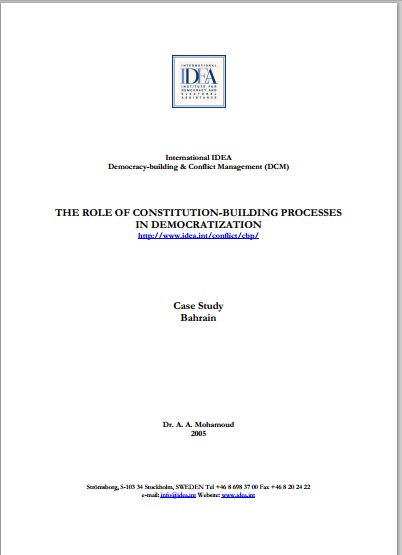The Role of Constitution-Building Processes in Democratization - Case Study Bahrain

The current political and institutional reform process in Bahrain is in many ways unique and is likely to serve as a catalyst for further reform in the Arab world. Confounding expectations the incumbent power elites have themselves voluntarily initiated reform of the political system in the country, albeit in response to popular demand for greater participation and greater accountability. Just a few years ago, no would have believed that such sweeping political transformation was possible in Bahrain or in any other country in the region within this short time frame. The extreme conservatism of the Arab world’s political practices and social environment seemed to have rendered it impervious to the winds of change blowing in from different parts of the world since the 1990s. Nevertheless, in 2001 the Bahraini political elites set in motion far-reaching political reforms which marked a turning point in the political history of the country. The reforms, despite their imperfections, have profoundly transformed the political landscape in Bahrain. Bahrain is the only country in the Gulf-states that has transformed its traditional Emirate political system into a modern constitutional monarchy, which - on the surface, at least -seems to be a major step forward. This is particularly remarkable considering the deep-rooted and rigid autocratic background against which the political reform process has been initiated. The political reform process in Bahrain was orchestrated by the established power elites as a tightly controlled top-down process and was implemented gradually and in a piecemeal manner. This contrasts strongly with the situation in Iraq where the established power elites were destroyed and new ones were created in a political vacuum. In this regard Bahrain and Iraq represent opposite ends of the contemporary political reform spectrum in the Middle East. Nonetheless, despite their different political transition trajectories there are important lessons that can be learned from both situations. As yet, there is no national consensus in Bahrain on the most appropriate policy strategy to carry out the reform process. The government and the opposition are divided into two uncompromising camps on the issue of how to proceed further. The government is pursuing a strategy of gradual and piecemeal political reform for ´orderly´ transition, whereas the opposition is keen to seize the momentum and is demanding immediate and wholesale reform of the political system. It is too early to predict which of the strategies is best suited to carrying the political reform process forward without endangering the fragile political stability in the country. Perhaps, keeping in mind the specificity of the current social environment in Bahrain, it may be necessary to find a compromise formula designed to consolidate and build on the positive achievements so far gained from the reform process. On this issue Bahrain and other countries in the Middle East can learn something from the recent experiences of Eastern European countries. However, a word of caution is needed here: political transformation in most Eastern European countries was rapid, dramatic and revolutionary in nature because of the collapse of the communist state system. This rapid change is not likely to suit the current negotiated transitions in Bahrain and other countries in the Middle East. In the Middle East, it is highly probable that negotiated transitions may have a greater potential to bring about fundamental and lasting political change if they are evolutionary and are implemented in a gradual and incremental manner.1 The impact of the political reform process has been felt on different fronts in Bahrain. In particular, the drafting of the National Action Charter and the popular referendum upon which the Constitution Building Processes (CBP) was based have helped heal social divisions in Bahraini society. For instance, the bargaining of the important stakeholders and the popular participation in designing the National Action Charter have been a great success. The negotiating process resulted in a compromise formula that diminished violent social tensions, brought political stability, opened up limited political participation to the public and legitimised the government in the eyes of the outside world. In this respect, Bahrain has achieved a remarkable success. The impact of the political reform was also felt beyond Bahrain, with neighbouring countries such as Saudi Arabia closely and apprehensively monitoring the process. More importantly, the American government now refers to Bahrain as a model of political freedom and democracy in the Gulf-states and frequently urges other countries in the region to look to Bahrain for guidance and inspiration. There is no doubt that today Bahrain is at the forefront of the political and institutional reform process in the Gulf-states. This makes Bahrain a perfect place to observe the dynamics of the contemporary top-down political reform process as it is unfolding in the Middle East. This is particularly significant as Bahrain is now going into its second parliamentary elections, which are scheduled for October 2006. There are practical lessons that can be learned by other countries in the region from the Bahraini experiment in political reform. Urgent action is needed on the proposal of the International IDEA to organise a regional conference on the Constitution Building Processes (CBP) in the Middle East. Such a conference would enable the countries in the region to learn from each other and exchange experiences of the political reform process with respect to achievements and best practices, positive examples, innovative ways of overcoming practical challenges and set-backs that are inherent in the transition processes. This report is divided into three parts. The first part briefly outlines the political background under which the current political and institutional reform process has taken place. The second part discusses the manner in which the political reform process was carried out. The third part considers the impact of the CBP on political transformation and democracy building in Bahrain and the challenges to be addressed.